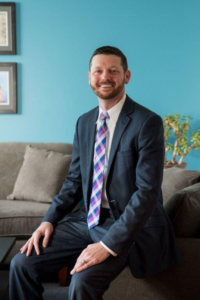A leading child advocacy group on Tuesday urged lawmakers to put $300 million into funding child care in Kansas, saying it should be treated the same way the Legislature allocates money for highways, high-speed internet and schools.
“Right now, if it weren’t for federal funds and tobacco settlement dollars, Kansas would essentially be spending nothing on child care. This has to change,” said John Wilson, president and CEO of Kansas Action for Children.

“This crisis will never end until the Legislature invests in child care like it does transportation, broad band, public education or any other infrastructure,” Wilson told the special joint committee on child care centers and child care homes.
“Child care and child care workers are the backbone of a thriving economy and are essential to the health and development of children,” the former Democratic lawmakers to the committee on Tuesday.
With a historically large surplus, Wilson called on lawmakers to put $300 million into child care as a starting point.
“Certainly, we can fiddle with regulations, but that’s not going to fix the crisis.”
The special joint committee is an outgrowth of efforts last legislative session to develop new rules and regulations that were intended to make child care more accessible.
Gov. Laura Kelly vetoed a bill that was aimed at expanding access to child care because she said it would relax safety standards for children.
A group of Republican lawmakers criticized the veto, saying it was intended to address a child care crisis the governor said was a priority.
The interim committee committee is looking for ways to address child care, but whether that means more money remains a larger question.
The latest data from Child Care Aware of Kansas shows the state needs about 85,000 child care slots to meet demand even though Kelly administration recently allotted about $43 million in mostly federal money to create new slots statewide.
The state recently received $40 million from the U.S. Treasury Department to build or renovate multipurpose facilities to create new licensed child care slots and provide access to high-speed internet.
Wilson gave the committee a list of suggested investments in a letter signed by more than 100 day care providers and other interested parties.
Wilson characterized the letter as the “closest thing to consensus” from the child care community when it comes to policy and funding priorities.
Among other things, the group recommended:
- Increasing eligibility for child care assistance up to 450% of the federal poverty level for family income and eliminating cost-sharing for families earning under 175% of the federal poverty level.
- Funding grant programs to provide bonus payments to child care workers for longevity and degree completion.
- Funding to help child care workers obtain health insurance.
- Providing grants for infants and toddlers, children with disabilities, nontraditional hour care, and other specialized circumstances that would enable child care providers to expand their services.
Republican state Sen. Renee Erickson of Wichita, chair of the joint committee, said there are questions about whether such a proposal would be sustainable and whether that’s the role of government.
“As someone who believes in free-market principles and limited government, my question would be what is the appropriate role of government in child care,” Erickson said.
“Yes, there’s a need. Is it the government’s role to fund that entirely? Is it not? I would question if that’s the role of the government.”
Other Republican lawmakers questioned the value of devoting money to child care without making other adjustments to regulations first.
“Our first priority has to be help families and children, but we can’t fix our child care system by simply throwing money at it,” said Republican state Rep. Kenny Titus of Manhattan.
“We have to first make structural changes to ensure our existing regulatory programs are carried out in a fair and efficient manner that do not unduly burden care providers.
“However, there will probably be some strategic investments necessary to maximize such reforms, and I hope that the Legislature is willing to take a creative approach to these solutions given the magnitude of the problem.”













